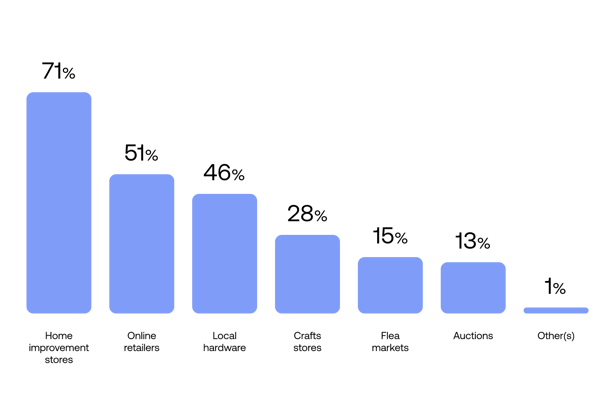Stylish, Thrifty and Versatile: The Latest UK DIY & Home Improvement Trends
Survey Experts · 25.10.2023 · 13min read
Content
Have you ever found yourself staring at that blank wall in your living room, thinking, "I could totally spruce this up," or maybe pondering how a touch of paint could transform your drab bedroom into a cosy sanctuary? Well, you're not alone!
In this blog post, we're diving headfirst into the exciting world of DIY (do it yourself) and home improvement projects. We'll explore why so many consumers are rolling up their sleeves, grabbing their toolkits, and embarking on creative journeys right in the heart of their homes.
We have asked 1000 people in the UK all about their recent projects and how they get them done and we’ll go over the results of our Appinio Hype Train Report.
Key Takeaways from the Appinio Hype Train Report
- Changing Landscape
Home improvement and DIY projects in the UK have seen a significant boost, driven by the pandemic, remote work, and a desire for more functional and pleasant living spaces. Despite economic challenges, consumers are investing in their homes.- DIY Motivation
Brits are taking on DIY projects primarily for maintenance and repairs, the sense of accomplishment, and cost savings. This shift is not just about necessity but also about personal satisfaction and financial prudence.- Inspiration and Shopping Trends
Social media is a dominant source of DIY inspiration, particularly platforms like Instagram, while friends and family's homes and TV shows continue to play a significant role. In terms of shopping, home improvement stores, online retailers, and local hardware shops are popular choices. Quality, price, and durability are key in purchasing decisions.
💡 Ready to always for some crafty insights? Then download the Hype Train Report for free!
The appeal of DIY projects for consumers
Homeowners’ behaviour has changed significantly in the past few years.
The pandemic gave rise to a huge boom in home improvement and DIY projects. Brits were forced to spend more time in their home, including working remotely, therefore they started upgrading their space making it more pleasant but also more functional. Statista reveals that in 2022, consumer expenditure amounted to around 6.2 billion pounds, a reduction of approximately 900 million when compared to the preceding year.
So, was COVID the only push for DIY and home improvement projects?
Certainly not, there are plenty of reasons why we can't resist the siren call of DIY:
- Maintenance and repairs: 54% of Brits say their biggest drive to engage in DIY projects is because something got broken and needed fixing. Of course, these are small repairs or quick replacements that can be done at home without the help of professionals.
- Sense of accomplishment: There's nothing quite like the feeling of stepping back and admiring a project you completed from start to finish, 51% chase that DIY high.
-
Cost savings: Let's face it; moving houses or hiring home improvement contractors can be seriously expensive, that is why 49% DIY where possible and save a pretty penny by doing things themselves. Even if 64% of Brits had to stop their DIY projects in their tracks due to soaring inflation rates.
Common DIY and home improvement projects in the UK
Alright, let's get down to the nitty-gritty of the home improvement projects! We're about to take a tour of some seriously cool and common DIY projects and home additions. From simple hacks to ambitious undertakings, there's something for everyone to sink their teeth into.
- Gardens, patios, and garden gnomes
Do Brits have a green thumb and some outdoor space? Absolutely! 54% are creating a little oasis! Choosing beautiful flowers may come easily to mind, but improving a garden can entail so much more, garden design, vertical gardening, container gardening, installing small fountains, creating a safe haven for travelling birds and squirrels, installing flattering lighting or even introducing seasonal decorations (Christmas is coming!) - Paint the town red, or maybe vermillion?
Whether they’re going for a fresh coat of white or diving into a vibrant accent wall, 53% of Brits have been painting a lot lately. - Is that a great sofa or is it just Pinterest?
Buying new furniture or giving old furniture a makeover is one of the easiest ways to improve a home, and one in two (50%) Brits have been assembling and fitting furniture to give a makeover to their home.
Sustainability and home improvements
There’s also an environmentally conscious side of DIY and home improvement. It's not just about enhancing your space; it's about doing it in a way that's sustainable and eco-friendly.
When it comes to being eco-friendly at home, one of the first things consumers do is improve their energy efficiency.
DIYers are playing a pivotal role in energy conservation. The numbers show a growing interest in projects that focus on boosting energy efficiency. From installing energy-efficient appliances to improving insulation and incorporating solar panels, these initiatives not only save money but also reduce carbon footprints.
Reducing or minimising waste is another way of working towards a more sustainable home, repurposing or recycling old furniture, or starting composting.
Furthermore, many (40%) UK DIY enthusiasts think of opting for environmentally friendly building materials, such as reclaimed wood, bamboo, and recycled metal when buying DIY supplies.
Where and how Brits get their DIY gear
When it comes to sourcing DIY gear and supplies in the UK, Brits have a variety of options at their disposal.
According to the Appinio Hype Train Report data:

- A significant majority, around 71%, prefer to purchase their DIY essentials at home improvement stores such as Argos or B&Q. These well-known retailers offer a wide range of products, from power tools to paint, making them a go-to destination for DIY enthusiasts looking for convenience and a comprehensive selection.
- Online retailers are another popular choice, with 52% of respondents opting for the ease of online shopping. The digital landscape has revolutionised the way we approach DIY, allowing consumers to browse, compare prices, and read reviews from the comfort of their homes.
- Local hardware shops also play a crucial role, as 46% of respondents favour these establishments for their proximity and personalised service. For many, the local hardware shop remains the heart of the community and a trusted source for expert advice.
Interestingly, there's a generational shift in shopping preferences. Older respondents tend to frequent home improvement stores, while the younger crowd leans towards craft stores and flea markets.
Regardless of where they shop, quality, price, and durability stand out as the top factors influencing purchasing decisions, with 82% of respondents emphasising the importance of quality and price, and 80% valuing the durability of their DIY supplies. These factors collectively guide the choices of UK DIY enthusiasts as they embark on their creative projects, ensuring that they get the best value for their efforts.
Online resources and inspiration
When it comes to sparking their DIY creativity, Brits have a diverse array of sources that serve as wellsprings of inspiration.
- Social Media
A significant 42% of them turn to the expansive world of social media, where visual platforms reign supreme and craft ideas are abundant.
Instagram takes the crown as the most popular source of inspiration, capturing the imagination of 67% of social media-inspired DIY enthusiasts.
Facebook and TikTok also hold sway, with 44% and 42% respectively, demonstrating the power of captivating visuals and engaging content in giving DIY ideas to consumers.

- Family’s & friends’ homes
Equally influential are the homes of family and friends, with 42% of Brits drawing inspiration from the creative ideas they encounter within their personal circles. - Television
This remains a classic source of craft ideas for 41% of Brits. With home improvement programs offering a steady stream of innovative projects and design concepts. These shows continue to be a trusted resource for those seeking practical guidance for crafts to do at home, the latest trends and inspirational home additions.
The impact of social media on DIY inspiration is especially pronounced, with 69% of users following home improvement project accounts on platforms like Instagram, where they can access a constant flow of innovative ideas.
In fact, 57% of those who seek DIY inspiration on social media have actively tried replicating home improvement projects they've discovered, highlighting the influential role of online content in motivating real-world action.
Moreover, nearly two-thirds (66%) of Brits who use social media for DIY inspiration have purchased DIY items based on recommendations from social media or online reviews. This highlights the powerful combination of visual inspiration and user-generated recommendations in shaping DIY endeavours, as Brits navigate the world of home improvement with a wealth of virtual resources at their fingertips.
New trends around DIY and home improvement
The DIY space is constantly evolving, and new trends are emerging to inspire and challenge DIY enthusiasts across the UK.
![]()
- Second-hand furniture
One standout trend that's generating substantial buzz is the revival of second-hand furniture. It's not just about repurposing and upcycling, but also a keen focus on sustainability, cost-effectiveness, and the allure of unique and vintage pieces. Online marketplaces have become bustling hubs for those on the hunt for pre-loved treasures, and DIY trends. - Outdoor living spaces
The Appinio Hype Tracker revealed Brits’ fascination with outdoor living spaces. The buzz surrounding this trend indicates a strong desire to expand and enhance living spaces beyond the walls of our homes. This shift might be fuelled by a growing appreciation for outdoor activities and the desire to create comfortable, functional outdoor areas. - Open floor plans
Lastly, open floor plans are making waves in the DIY landscape. While they don't create as much buzz as the other trends, they're still significant. There's a clear fascination with flexible and spacious interior layouts, reflecting a desire for more versatile living spaces. This trend emphasises the importance of adaptability and multifunctionality in our homes, aligning with the changing needs and preferences of modern living. It's about creating spaces that can seamlessly transform to accommodate various activities and moods. - Brightly coloured feature walls
High curiosity, awareness, and consumer discussions surrounding this hype suggest that this design trend has gained significant attention and may be a popular choice among those looking to revamp their living spaces with a touch of creativity and personalisation, extending even to DIY wall art.
These new DIY trends aren't just about aesthetics; they represent a shift towards more sustainable, versatile, and enjoyable living spaces. As DIY enthusiasts explore these trends, they're not just remodelling their homes; they're reshaping the way they live.
Conclusion for DIY trends
The world of DIY and home improvement in the UK is more vibrant and dynamic than ever. From revamping spaces with brightly coloured feature walls to embracing sustainable and eco-friendly practices, Brits are redefining their living environments. New trends reflect a desire for versatile and enjoyable living spaces.
DIY is not just about home remodelling ; it's about reimagining the way we live.
Interested in running your own study? The get in touch with our research experts and walk them through your ideas!
Get facts and figures 🧠
Want to see more data insights? Our reports are just the right thing for you!


